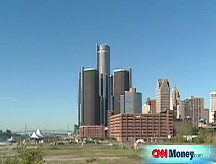Chrysler in a crunch
With a 'viability' deadline looming, Chrysler could be digging its hole even deeper.
NEW YORK (CNNMoney.com) -- Just days before Chrysler LLC is supposed to show the government it can become a healthy company, the automaker has been scrambling to get dealers to order more cars.
The push will bring in cash, but it also undercuts the value of Chrysler's cars and trucks, analysts say, applying a short-term fix to a long-term problem.
Chrysler's sales pitch to dealers was that having more orders on its books would help the automaker appear healthier to the government, to which it has to submit a viability plan on Tuesday. Without Uncle Sam's thumbs up, Chrysler would not only lose out on $3 billion in requested loans, but it would also have to give back $4 billion already lent to it.
"This has less to do with the actual business than it has to do with making the business case," said Jesse Toprak, an industry analyst with Edmunds.com.
Chrysler officials would not comment on the discussions with dealers, citing their confidential nature, but the carmaker confirmed Friday that it had met its order goals.
Chrysler sales in January were down to almost half what they had been a year earlier. That was worse than the overall market, in which sales were down 36%. Meanwhile, Chrysler dealers had, on average about 150 days worth of vehicles to sell, according to Chrysler.
Chrysler co-president Jim Press said in a speech in Chicago Thursday that the carmaker sees more of the same for quite some time.
"At Chrysler, we've built into our planning the contingency that sales could stay at this level for up to four years," Press said. "We've told our dealers it's possible that one day we may even look back on January, 2009 as the 'good old days.'"
When it comes to selling off this added inventory, Chrysler expects no help from an improving economy, but pushing extra vehicles onto the market creates longer term problems beyond just having to sell them all, said Paul Melville, a partner with industry consultants Grant Thornton.
"The amount of stock on the market is going to drive residual values down," he said. Residual value is a measure of what a vehicle is worth in the used car market.
That's because, in order to sell all these vehicles, Chrysler is going to have to rely heavily on incentives, something the automaker is already doing. Last month, Chrysler spent $4,300 on incentives per vehicle, according to an analysis by Edmunds.com. The industry average was $2,700.
Besides costing money and eating into profits, incentives drive down the value of vehicles in the used car market, Melville said. That causes an ongoing drag on sales by making returning customers' trade-ins worthless and by making other car shoppers reluctant to buy the vehicles at all. That, in turn, leads to more incentives, and so on, in a cycle that can be difficult to break.
In the near term, Chrysler incentives will likely start going up higher this spring even as they drop for other manufacturers, Toprak said. Other manufacturers are expected to have lower inventories, he said, because their sales haven't dropped as much and they haven't pushed vehicles into dealer inventories to the degree Chrysler has.
While that's bad for Chrysler, for customers who plan to buy and hold a Chrysler vehicle - in other words, those who aren't concerned about resale value - the crisis presents some opportunities.
"From a nominal purchase price, you're probably going to see some of the best deals out there," he said. ![]()


